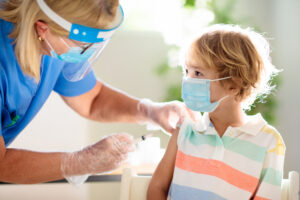Now that the COVID-19 vaccine is available for children ages five to eleven, many parents are on the fence as to whether or not to vaccinate their children.
For most children with COVID-19, the cases have been mild. However, the virus has been shown to be unpredictable, and most healthcare providers are urging parents to take all available precautions to protect against the virus.
Why Do Doctors Recommend the Vaccine?
For most clinicians in favor of vaccination, it comes down to the idea that no child should die from a disease that could have been prevented.
For many, COVID-19 is now a vaccine-preventable disease.
According to the FDA, COVID-19 was the 8th highest killer for children in this age group over the last year. According to the CDC, at least 791 children have died from COVID-19, including 172 children ages 5 to 11. More than 8,300 kids aged 5 to 11 have been hospitalized with COVID-19 because of serious illness.
How Well Does the Vaccine Work for Kids?
The data the drug companies presented to the FDA showed that the vaccine was 90.7 percent effective against symptomatic COVID-19. The antibody response to the vaccine was comparable to the one seen in people 16 to 25 years old.
Pediatricians also point to real-world data on the effectiveness of the vaccines in 12- to 17-year-olds. Amid the recent Delta variant surge, hospitalization rates were about 10 times higher in unvaccinated adolescents than vaccinated ones, according to a recent CDC analysis.
What are the Common Side Effects?
No new safety problems were identified in the companies’ studies of this vaccine.
The most common side effects documented in the study were similar to those other age groups have had with COVID-19 vaccines.
The most common were:
- pain at the injection site
- fatigue
- headache
- muscle aches
Most children who get the vaccine feel fine in two or three days.
What is Myocarditis?
In very rare cases, following vaccination with mRNA vaccines made by Pfizer and Moderna, people have developed inflammation of the heart muscle, which is known as myocarditis.
Doctors say this is extremely rare, and most cases resolve on their own.
In Pfizer’s clinical trial for 5- to 11-year-olds, there were no cases of myocarditis, although the company acknowledged that the trials were not big enough to pick up such rare events.
According to NPR, rates of post-vaccination myocarditis are expected to be lower in young kids than those observed in teens.
Myocarditis, which can also occur after bacterial and viral infections, is generally significantly less common among younger children. That’s partly because the condition is linked with puberty hormones. The smaller dose size for younger kids may also reduce the risk.
Doctors say the observance of myocarditis may be due to an overzealous effort of the immune system to protect against the virus.
Who Should Prioritize Getting the Vaccine?
- Kids that have conditions that put them at higher risk for severe disease including obesity and chronic respiratory conditions
- Those with kidney disease or high blood pressure
- Families with vulnerable people including babies or grandparents
- Immunocompromised family members
- Those who live in colder weather climates that may be indoors, increasing the risk of catching COVID-19
- Those gathering with family for the holidays
If My Child Already Had COVID-19, Do They Need the Vaccine?
Even for kids who’ve already had COVID-19, pediatricians say it’s still beneficial to get the vaccine.
“We don’t yet really understand the duration of immunity when it comes to kids,” says a pediatrician in Cincinnati, Nicole Baldwin. “Often kids get mild infections so we don’t know what that correlates to in terms of antibody levels and how long are they going to be protected,” she told NPR.
Can I Just Wait?
Many doctors urge parents not to wait, because their children will still be at risk for getting sick from COVID-19.
If My Child is 11, Should We Wait to Get Them the Higher, Adult Dose at Age 12?
If your child is 11, the dose provided in the children’s formulation is enough to protect them from the virus. If your child is in between birthdays for the first and second dose, the American Academy of Pediatrics suggests sticking with the lower dose for both shots.
How Will Vaccinating My Child Help in the Fight Against the Virus?
As we start to increase vaccinations, there will be more protection against the virus. As you and your family get vaccinated, you will improve the overall immunity against COVID-19.
As cases continue to drop across the country, mask mandates may be lifted, which could increase the likelihood that — especially unvaccinated — kids could get COVID-19.
Additionally, in areas with mask mandates or strict regulations, vaccinations will help us all return to a normal, safe environment.
Where Can I get More Information?
If you would like more information about the vaccine, talk with your provider at Davidson Family Medicine. We have resources available for you, and we would be happy to talk to you about your questions or concerns.
Contact Davidson Family Medicine at (704) 892-5454 for more information on COVID-19 vaccines or to schedule an appointment.

